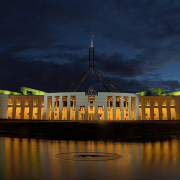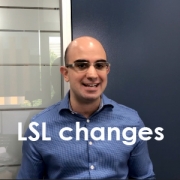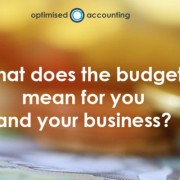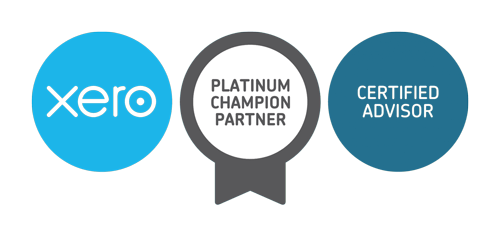Budget wrap-up 2018

Tuesday night Scott Morrisson handed down what can be best described as an pre-election Budget and in our opinion a very tax centric budget.
No major announcements of increases or decreases in service spend and It is still expected that the budget will return to surplus in the 2019/20 financial year.
Did you see Shaun’s video on Facebook? We’d love to hear what you thought, we’ve included it again below.
Budget wrap-up 2018 from Optimised Accounting on Vimeo.
Tax cuts
The big headline of the budget was the income tax reforms that will phase in over the next 7 years.
These cuts will phase out the middle 37% bracket progressively by increasing the income threshold from the current $87,000 to $90,000 from July this year then to $120,000 from 2022 and eventually abolishing the bracket entirely in 2024.
In 2024 the government is also proposing to increase the income threshold for the top 45% tax rate from the current $180,000 to $200,000.
Whilst any tax relief is promising, the staged timeframe makes this anything but certain. Future governments may water this down or delay the inception dates.
The more immediate tax relief which will come in to affect from 1 July this year:
- Taxpayers earning below $37,000 will see a tax benefit of up to $200
- Taxpayers earning $37k–$48k will receive up to $530, at an increased rate of .3c per dollar
- Taxpayers earning $48k–$90k will receive a tax cut of $530 per year starting from 1 July
- The $530 will phase out between $90k–$120k
Tax rates from 2019
| TAX RATE | PROPOSED (2019) | PROPOSED (2022) | PROPOSED (2024) |
|---|---|---|---|
| 0% | 0–$18,200 | 0–$18,200 | 0–$18,200 |
| 19% | $18,201–$37,000 | $18,201–$41,000 | $18,201–$41,000 |
| 32.5% | $37,001–$90,000 | $41,001–$120,000 | $41,001–$200,000 |
| 37% | $90,001–$180,000 | $120,001–$180,000 | N/A |
| 45% | $180,001+ | $180,001+ | $200,001+ |
It is important to note that the government isn’t changing tax rates to achieve this, rather they are adding a new tax offset. This will prevent taxpayers on incomes higher than $120k from seeing these benefits.
In addition to this, the planned increase of the Medicare Levy from 2% to 2.5% has been scrapped.
Small business
- Businesses with a turnover of up to $10m will appreciate the extension of the $20k immediate write-off which was due to expire on 30 June this year. Purchases (of eligible assets) under $20k for small businesses will be able to be immediately deducted if first used or installed ready for use by 30 June 2019. Only a few assets are not eligible for this including horticultural plants and in-house software.
- Assets valued at $20k or more will continue to be placed into the small business simplified depreciation pool (the pool), depreciating at 15% in the first year and 30% each year after that.
- From July 2019 businesses will no longer be able to claim a deduction for payments to their employees for wages where they have not withheld any amount of PAYG from these payments.
- Payments of over $10k made in cash are now outlawed. This along with more robust compliance in the cash economy is expected to raise $5.3 billion.
- In a move to prevent Phoenix activity, greater personal liability will be placed on directors. Director penalty notices will be extended to include GST debt as well as the existing arrangement that covers Superannuation and PAYG Withholding.
- The tax office will also have contractors in its sights by widening the TPAR Contractor Reporting – this is now extended to include security & investigation services, road freight transport and IT related services.
- Contractor payments with no ABN’s supplied are no longer tax-deductible unless PAYG is withheld.
The commitment to lower company tax rates to 25% is still ongoing with no changes announced this will happen progressively until 2027
Superannuation
SMSF
- The government have proposed to increase the number of members in SMSF’s from 4 to 6 which is great for larger families.
- A 3 year audit cycle for SMSF’s with a good compliance history. Currently an annual audit, this will reduce red tape for trustees that have lodged the fund’s annual returns in a timely manner.
- Both of these moves will assist in spreading and lowering compliance costs for SMSFs.
Commercial funds
- Exit fees will be banned
- Insurance will be opt-in rather than opt-out for members who are either under 25, have under $6k in their account or have not contributed for 13 months.
Everyone making personal contributions
- The government intends to improve the ‘notice of intent’ process which will help those adding in personal contributions to their super but failing to get a deduction for it.
- Currently the work test restricts the ability to make voluntary super contributions for those aged 65–74 to those who self-report as working at least 40 hours in any 30 day period in the financial year. An exemption is going to be added for the first year that they do not meet these requirements.

Written by Shaun Farrugia and the team at Optimised Accounting.
How does this compare to previous budgets? 2017 and 2016 wrap-ups can be viewed in our library.
If you have any questions about these changes, feel free to contact us on 03 8609 9226.
If you’d like to receive these kind of videos in your inbox, as well as other important information and due dates for your business, sign up to our newsletter here.
It’s not a boring accounting email, we try to cater it to what our clients want to see!
